Home > History
COMPANY
HISTORY
The history of Shikun & Binui is inseparable from that of the State of Israel and its infrastructures. Our roots were planted over ninety years ago, with the establishment of Solel Boneh as a small workers’ union serving the budding Jewish community in British-ruled Palestine. Since then, we have become instrumental to the construction of the Jewish State – the buildings and infrastructures we have constructed are part and parcel of Israel’s landscape. In the 1950s, we became one of the first Israeli companies to operate outside of Israel, laying the foundations for our global activity, which is currently spread across twenty countries on four continents.
2018
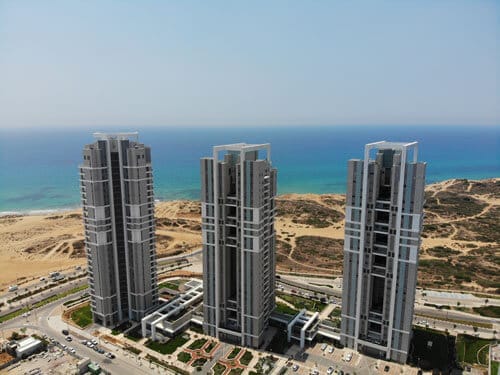
Photo by: PR
CHALOMOT TZUKEI HASHMURA, NETANYA
Photo by: PR
In 2008, Shikun & Binui became the first in Israel to adopt the voluntary green building standard as a binding, internal standard. Today, all residential construction starts of residential apartments in Israel are designed and built according to the local green building standard, IS 5281. Residential project Chalomot Tzukei Hashmura in the Ir Yamim neighborhood of Netanya is the first project of its kind in Israel that has been built to the Gold level of strict American green building standard LEED. The project is designed to maximize the use wind and sun to save energy, and includes improved thermal insulation that helps create a well-balanced and pleasant climate in the apartments throughout the year.
In 2008, Shikun & Binui became the first in Israel to adopt the voluntary green building standard as a binding, internal standard. Today, all residential construction starts of residential apartments in Israel are designed and built according to the local green building standard, IS 5281. Residential project Chalomot Tzukei Hashmura in the Ir Yamim neighborhood of Netanya is the first project of its kind in Israel that has been built to the Gold level of strict American green building standard LEED. The project is designed to maximize the use wind and sun to save energy, and includes improved thermal insulation that helps create a well-balanced and pleasant climate in the apartments throughout the year.
2016
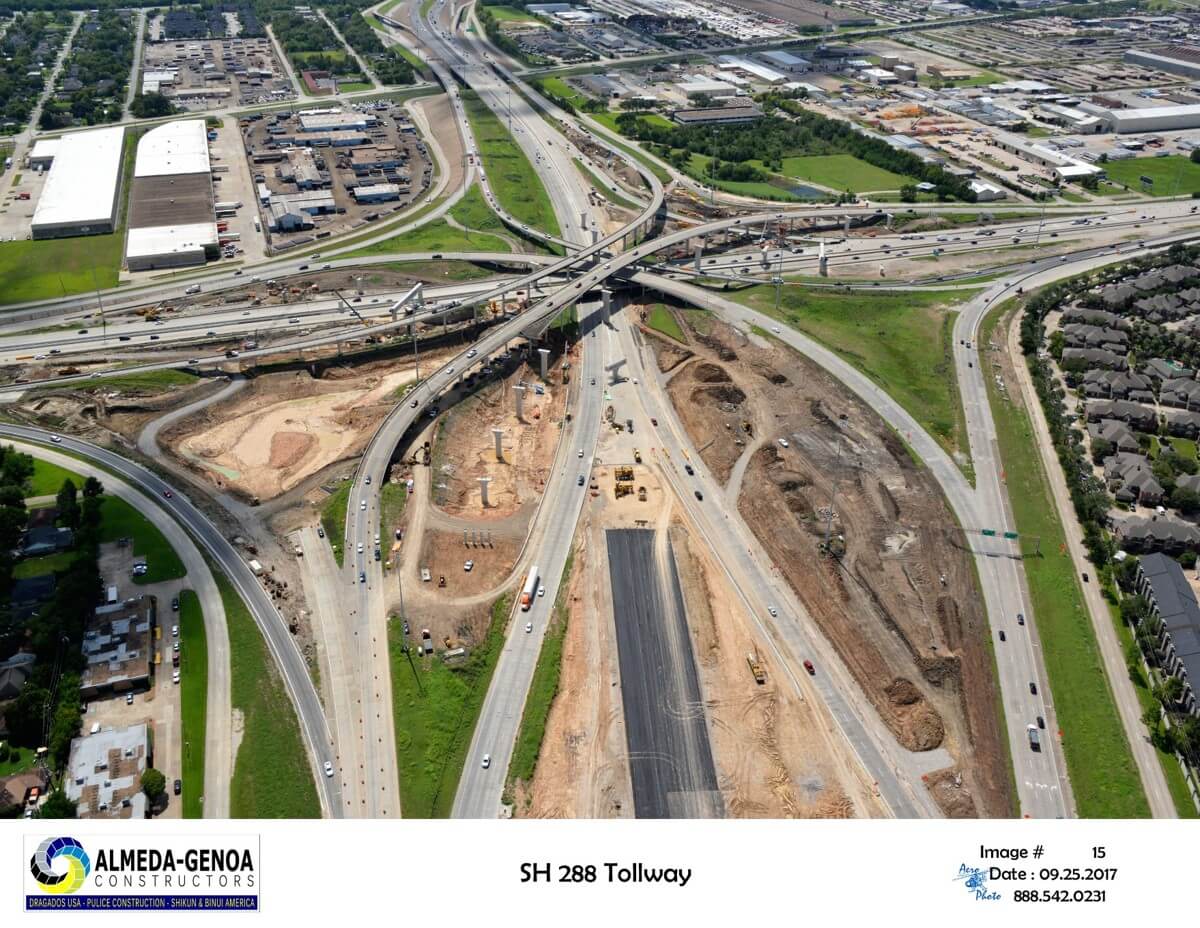
Photo by: Aero Photo
HIGHWAY SH-288 - HOUSTON, TEXAS, USA
Photo by: Aero Photo
The construction of Shikun & Binui’s first US concession project is underway: It is a PPP project for the planning, financing, construction, operation and maintenance of fast toll lanes, including advanced toll and traffic control systems, as well as upgrading, operation and maintenance of existing infrastructures on Highway SH-288 in Houston, Texas’ Harris County. The project includes the construction of four toll lanes at the center of an existing road, a direct interchange to the Texas Medical Center and eight direct interchanges between SH-288 and Beltway 8.
The construction of Shikun & Binui’s first US concession project is underway: It is a PPP project for the planning, financing, construction, operation and maintenance of fast toll lanes, including advanced toll and traffic control systems, as well as upgrading, operation and maintenance of existing infrastructures on Highway SH-288 in Houston, Texas’ Harris County. The project includes the construction of four toll lanes at the center of an existing road, a direct interchange to the Texas Medical Center and eight direct interchanges between SH-288 and Beltway 8.
2015
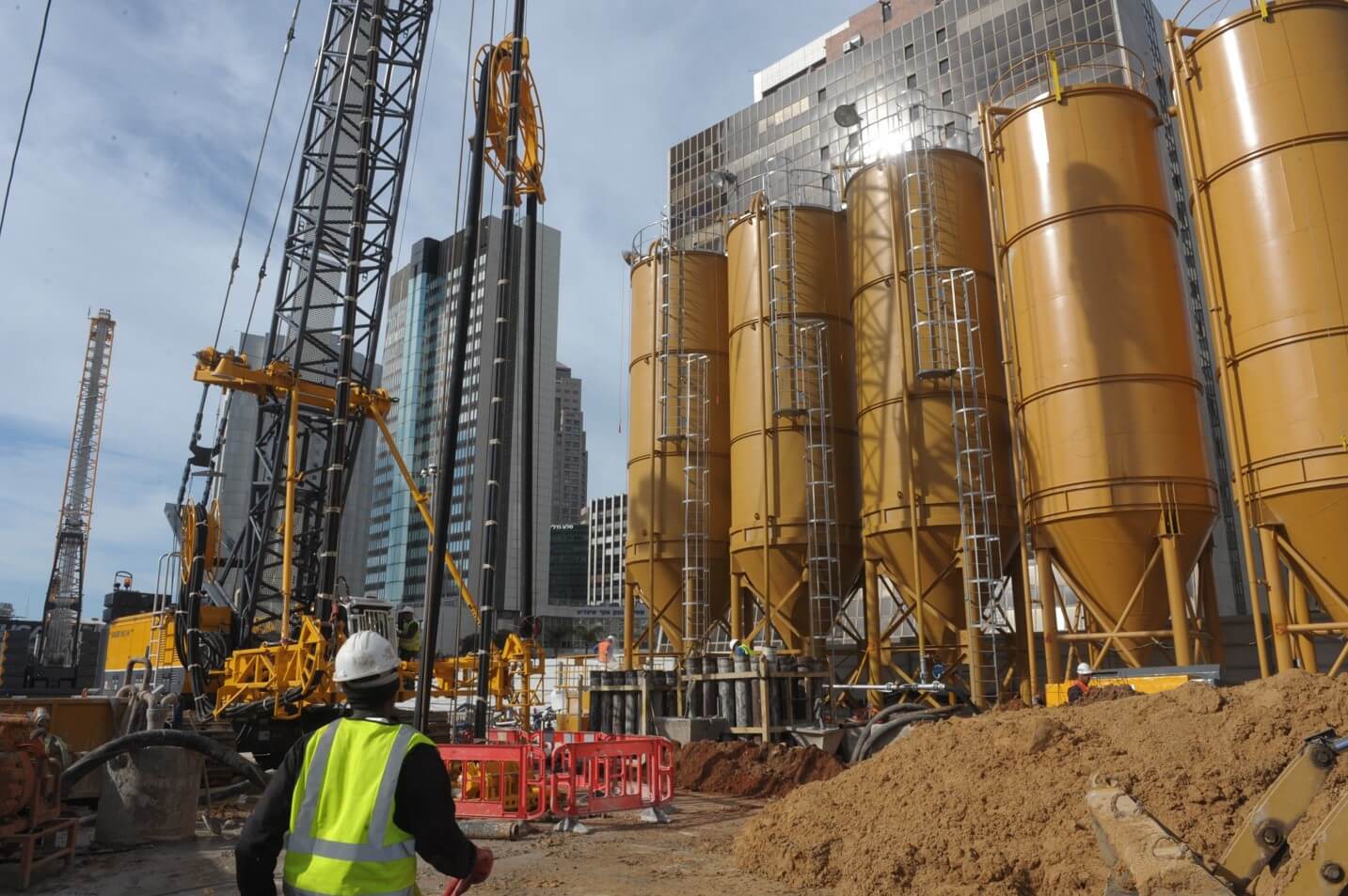
Photo by: Avshalom Sassoni
THE LIGHT RAIL PROJECT IN TEL AVIV
Photo by: Avshalom Sassoni
This is a mega-project of Shikun & Binui Solel Boneh, in cooperation with Chinese company CRTG. The two companies won a tender to dig two 5-km tunnels and build six stations in the western part of the Light Rail’s Red Line, as part of the mass transit system in the Tel Aviv metropolitan area. This project is one of countless infrastructure mega-projects in which Solel Boneh – the oldest of the Group’s companies – has taken part since its founding. These projects have become an inseparable part of Israel’s landscape and history.
This is a mega-project of Shikun & Binui Solel Boneh, in cooperation with Chinese company CRTG. The two companies won a tender to dig two 5-km tunnels and build six stations in the western part of the Light Rail’s Red Line, as part of the mass transit system in the Tel Aviv metropolitan area. This project is one of countless infrastructure mega-projects in which Solel Boneh – the oldest of the Group’s companies – has taken part since its founding. These projects have become an inseparable part of Israel’s landscape and history.
2014
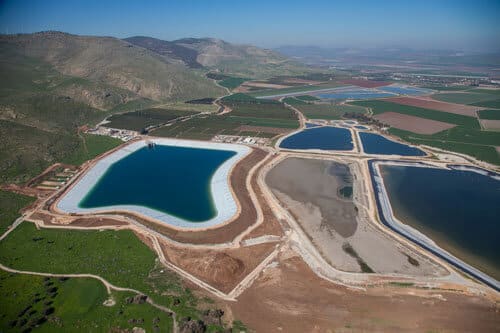
Photo by: Albatross
PUMPED STORAGE IN THE GILBOA
Photo by: Albatross
The pumped storage power plant in the Gilboa is another manifestation of the Group’s sustainable vision, which focuses on renable energy projects, tree preservation, water desalination and purification, and building green neighborhoods. This is accomplished through resource optimization to avoid harming natural ecosystems, communities and the economy, out of ongoing commitment to future generations. Photo: The 300 MW pumped storage power plant in Gilboa.
The pumped storage power plant in the Gilboa is another manifestation of the Group’s sustainable vision, which focuses on renable energy projects, tree preservation, water desalination and purification, and building green neighborhoods. This is accomplished through resource optimization to avoid harming natural ecosystems, communities and the economy, out of ongoing commitment to future generations. Photo: The 300 MW pumped storage power plant in Gilboa.
1999
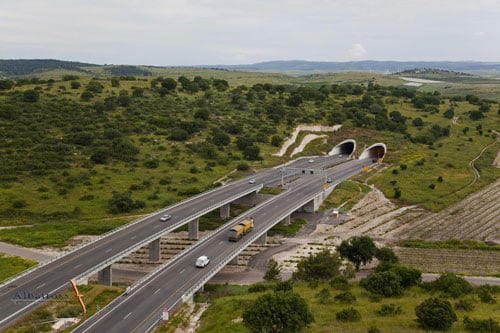
Photo by: Albatross
HIGHWAY 6
Photo by: Albatross
The Cross-Israel Highway is Israel’s first BOT project, longest road and first toll road. Currently the highway stretches over 138 km, with 12 interchanges, two tunnels (500 meter-long), and 100 bridges. It is expected to reach a total of 247 km in length. Shikun & Binui won the project bid together with a local partner and a Canadian company, who partnered under joint venture company Derech Eretz. The road’s central segments were opened to the public in 2002 and 2004. In July 2009, the company completed the highway’s 18th segment, bringing the road to a total length of 138 km.
The Cross-Israel Highway is Israel’s first BOT project, longest road and first toll road. Currently the highway stretches over 138 km, with 12 interchanges, two tunnels (500 meter-long), and 100 bridges. It is expected to reach a total of 247 km in length. Shikun & Binui won the project bid together with a local partner and a Canadian company, who partnered under joint venture company Derech Eretz. The road’s central segments were opened to the public in 2002 and 2004. In July 2009, the company completed the highway’s 18th segment, bringing the road to a total length of 138 km.
1996
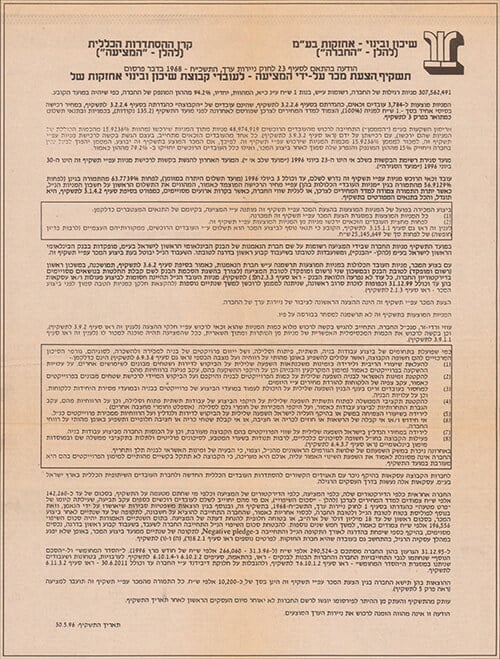
FROM A WORKERS’ UNION ORGANIZATION TO A BUSINESS
As part of a large-scale privatization of the Histadrut’s assets, the company’s shares were sold to its employees in an exclusive transaction. The deal was made possible by guarantees furnished by Ted Arison, in return for 15% of the Company’s shares and the right to purchase any shares sold later by the Arison Group. Following its acquisition, Shikun & Binui underwent an intense process of reorganization, and results were quick to follow – Shikun & Binui regained its leadership as Israel’s largest contractor. Among the projects in which the company was involved at the time were the construction of Zichron Ya’akov’s nature reserve, of Kessem Junction – including eight overpasses, Club Hotel Eilat, the Hyatt Regency Hotel in the Dead Sea, and the David Intercontinental Hotel in Tel Aviv. Photo: Offer of sale to the employees of Shikun & Binui Group Holdings.
As part of a large-scale privatization of the Histadrut’s assets, the company’s shares were sold to its employees in an exclusive transaction. The deal was made possible by guarantees furnished by Ted Arison, in return for 15% of the Company’s shares and the right to purchase any shares sold later by the Arison Group. Following its acquisition, Shikun & Binui underwent an intense process of reorganization, and results were quick to follow – Shikun & Binui regained its leadership as Israel’s largest contractor. Among the projects in which the company was involved at the time were the construction of Zichron Ya’akov’s nature reserve, of Kessem Junction – including eight overpasses, Club Hotel Eilat, the Hyatt Regency Hotel in the Dead Sea, and the David Intercontinental Hotel in Tel Aviv. Photo: Offer of sale to the employees of Shikun & Binui Group Holdings.
1966
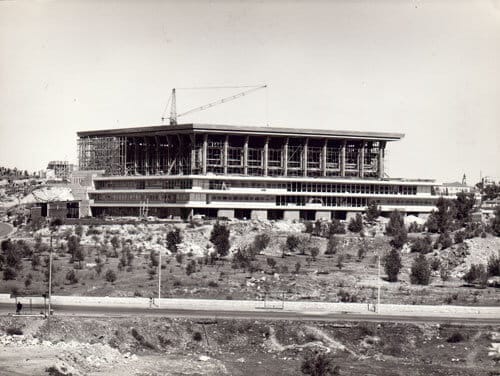
Photo by: Michael Maor
THE KNESSET
Photo by: Michael Maor
In 1955, the Government of Israel decided to build a permanent building for the Israeli parliament (Knesset) in Jerusalem. In 1957, architect Joseph Klarwein won the competition for planning the new building, yet the final structure was the joint creative effort of several architects, including Dov Karmi and son Ram Karmi. Solel Boneh won the construction bid together with subsidiary Even Sid. The building’s construction took nine years (1958-1966), and required special arrangements, such as setting up an on-site concrete production facility, employing massive-scale cranes running on wide rails, and employing hundreds of workers. Photo: Constructing the Knesset building, Jerusalem, 1960s.
In 1955, the Government of Israel decided to build a permanent building for the Israeli parliament (Knesset) in Jerusalem. In 1957, architect Joseph Klarwein won the competition for planning the new building, yet the final structure was the joint creative effort of several architects, including Dov Karmi and son Ram Karmi. Solel Boneh won the construction bid together with subsidiary Even Sid. The building’s construction took nine years (1958-1966), and required special arrangements, such as setting up an on-site concrete production facility, employing massive-scale cranes running on wide rails, and employing hundreds of workers. Photo: Constructing the Knesset building, Jerusalem, 1960s.
1958
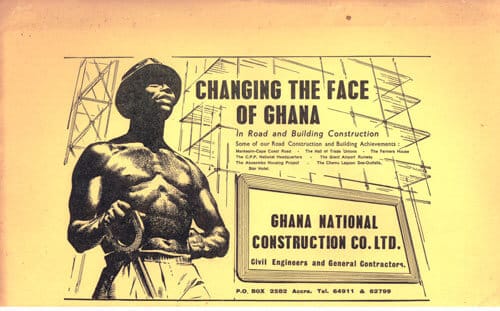
EXPANDING INTO AFRICA
In 1958, Prime Minister Golda Meir encouraged Solel Boneh to expand its operations into Africa. She viewed this activity as a steadfast expression of Israel’s capacity to assist, advance, and grow the forces of creativity and resources in African countries, later saying: “I viewed Solel Boneh as a first-class national instrument.” Photo: Ad by Solel Boneh’s first company in Ghana, 1960.
In 1958, Prime Minister Golda Meir encouraged Solel Boneh to expand its operations into Africa. She viewed this activity as a steadfast expression of Israel’s capacity to assist, advance, and grow the forces of creativity and resources in African countries, later saying: “I viewed Solel Boneh as a first-class national instrument.” Photo: Ad by Solel Boneh’s first company in Ghana, 1960.
1939
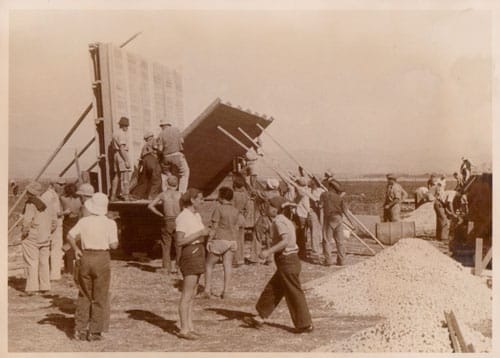
Photo by: Erich Comeriner
“TOWER AND STOCKADE”
Photo by: Erich Comeriner
Over the years, Solel Boneh has played a central role in realizing national, security and settlement objectives of the budding Jewish community in Palestine. One of the Company’s main projects was the building of 52 fortified Jewish agricultural settlements as part of the Tower and Stockade (Homa U’Migdal) campaign. Photo: Settling of Kibbutz Amir, one of the last communities established as part of the Tower and Stockade campaign.
Over the years, Solel Boneh has played a central role in realizing national, security and settlement objectives of the budding Jewish community in Palestine. One of the Company’s main projects was the building of 52 fortified Jewish agricultural settlements as part of the Tower and Stockade (Homa U’Migdal) campaign. Photo: Settling of Kibbutz Amir, one of the last communities established as part of the Tower and Stockade campaign.
1924
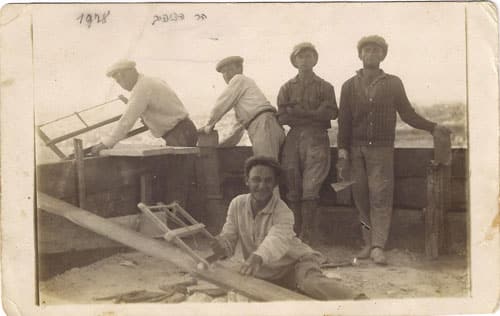
David Ben Ari Collection, Shikun & Binui Archives
FOUNDING OF SOLEL BONEH
David Ben Ari Collection, Shikun & Binui Archives
Solel Boneh (Hebrew for Paving & Building) was founded by the Histadrut (the General Organization of Workers in Israel), with the aim of uniting the sporadic groups of workers paving the roads and building the new state, quickly establishing itself as the largest contractor in Israel. These groups of workers courageously assumed complex pioneering projects, such as building the power plant in Naharayim, paving main roads across Israel, and constructing the first building of the Hebrew University in Jerusalem. These projects attracted hundreds of new immigrants fresh off the boat, with Solel Boneh’s people catering to their integration at work and training. Photo: Building the Hebrew University on Mount Scopus, Jerusalem, 1928.
Solel Boneh (Hebrew for Paving & Building) was founded by the Histadrut (the General Organization of Workers in Israel), with the aim of uniting the sporadic groups of workers paving the roads and building the new state, quickly establishing itself as the largest contractor in Israel. These groups of workers courageously assumed complex pioneering projects, such as building the power plant in Naharayim, paving main roads across Israel, and constructing the first building of the Hebrew University in Jerusalem. These projects attracted hundreds of new immigrants fresh off the boat, with Solel Boneh’s people catering to their integration at work and training. Photo: Building the Hebrew University on Mount Scopus, Jerusalem, 1928.

